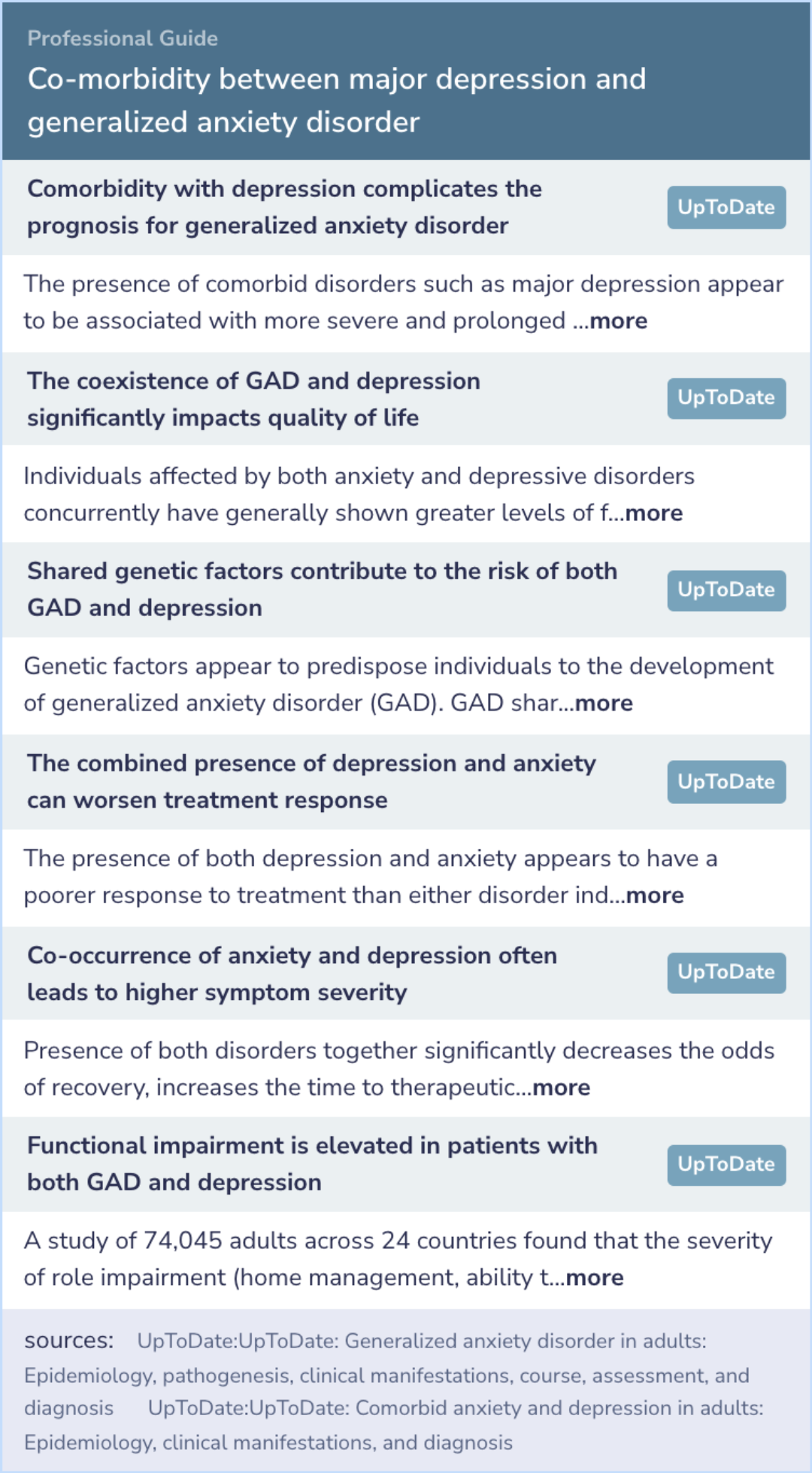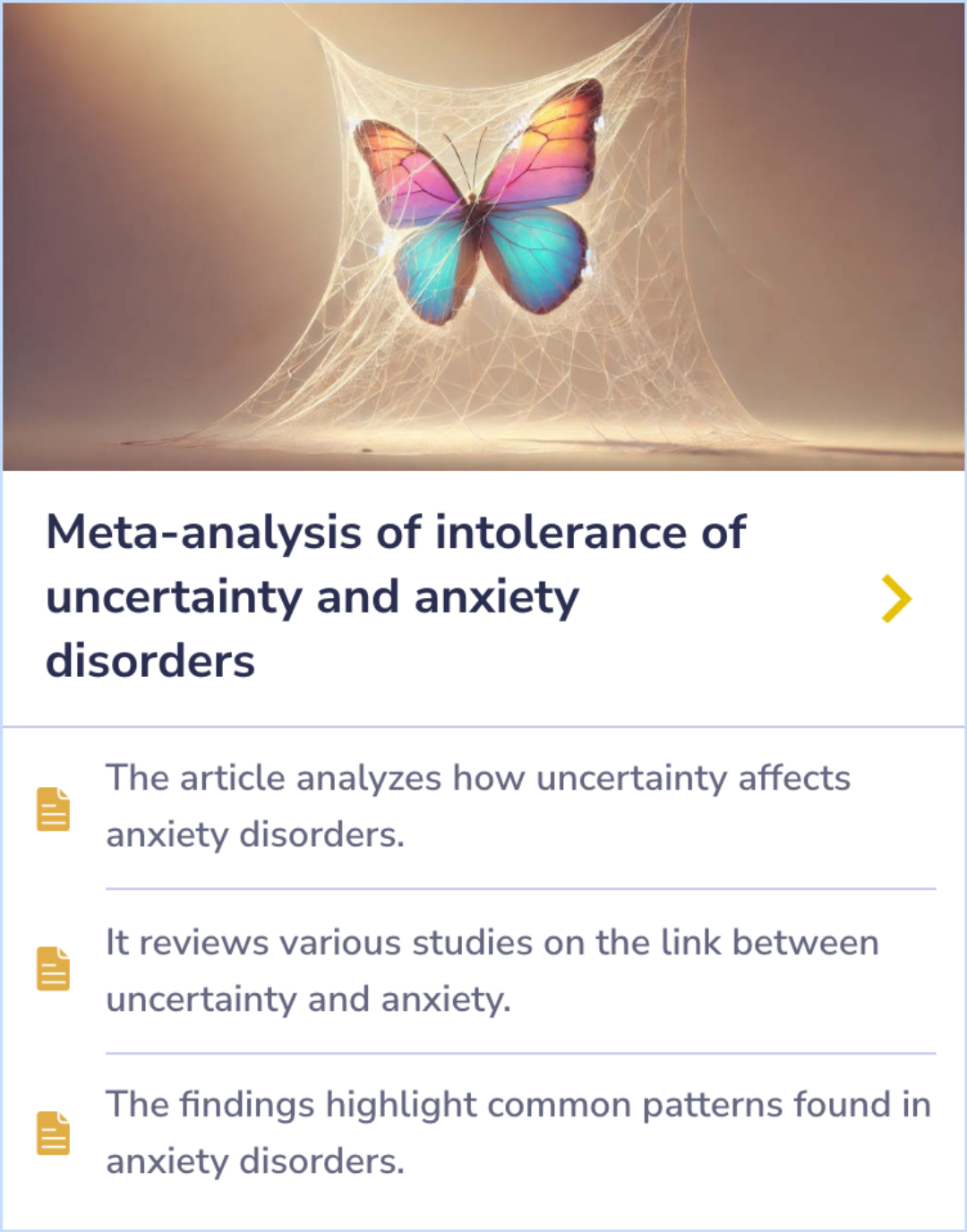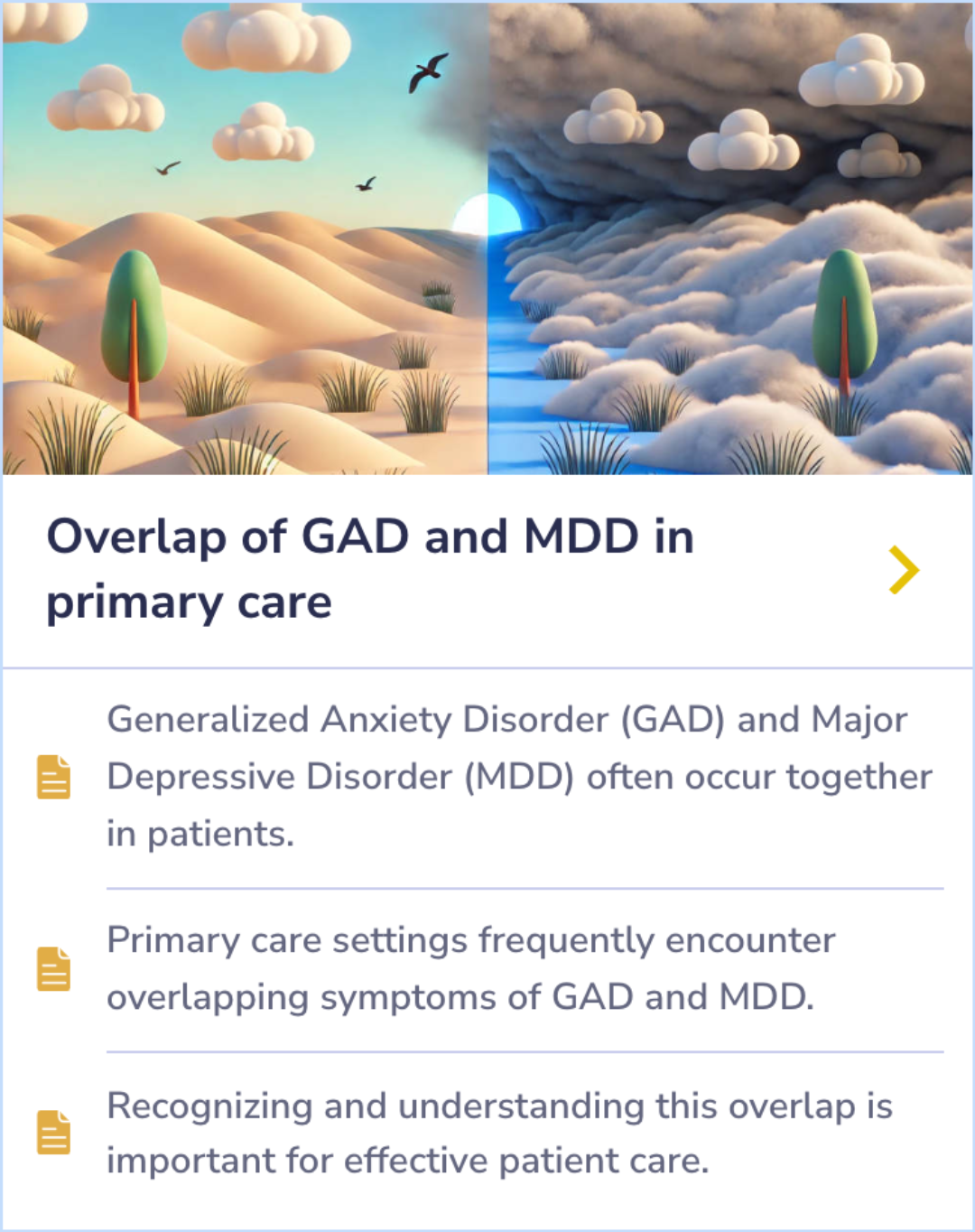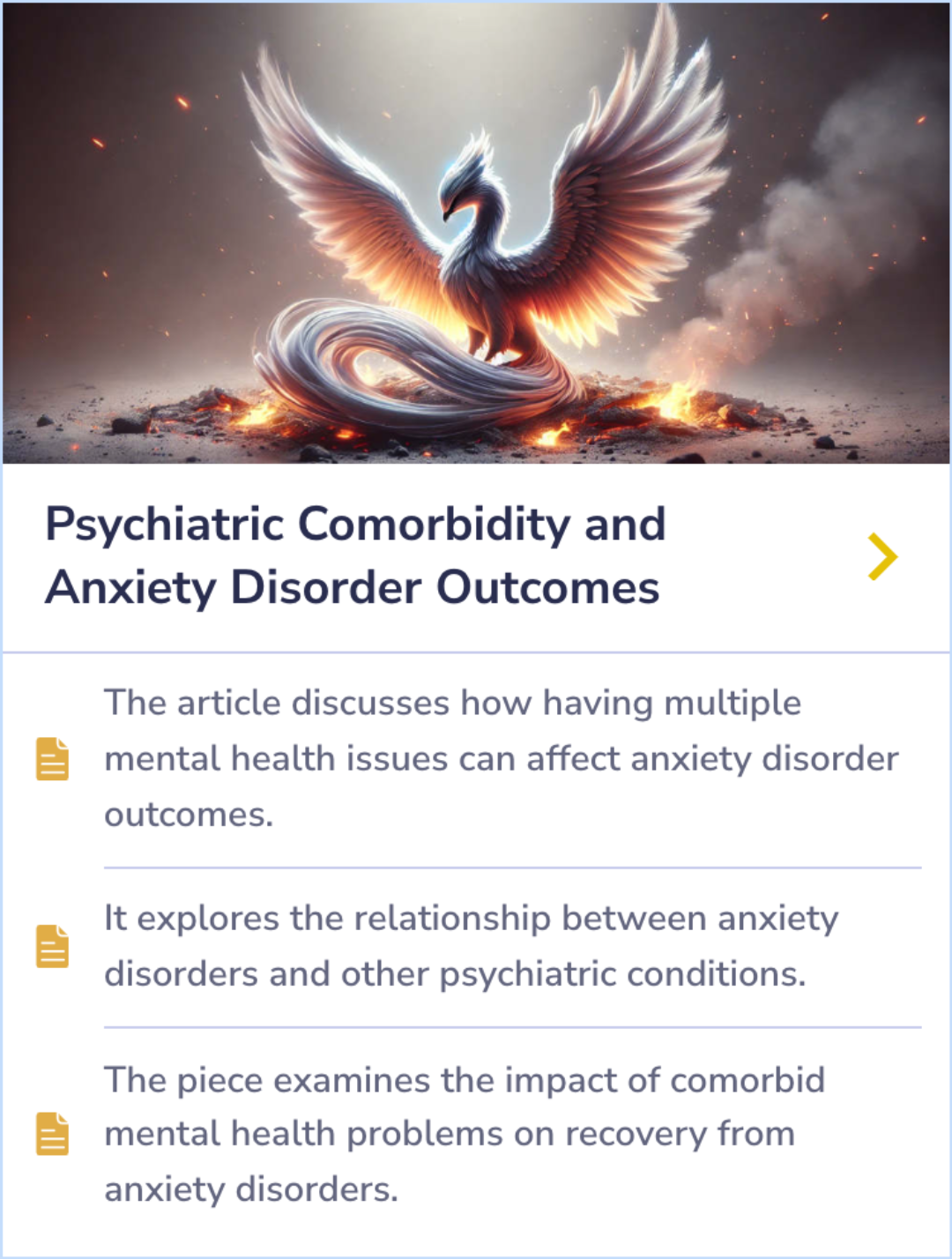Generalized Anxiety Disorder Papers
Visual Abstract
The sources of co-morbidity between major depression and generalized anxiety disorder in a Swedish national twin sample
Co-morbidity between major depression and generalized anxiety disorder
November 25, 2024
author
Kendler KS, Gardner CO, Gatz M, Pedersen NL
journal
Psychol Med
Date Published
2007 Mar
Why link to a visual abstract?
What is a visual abstract?
Original
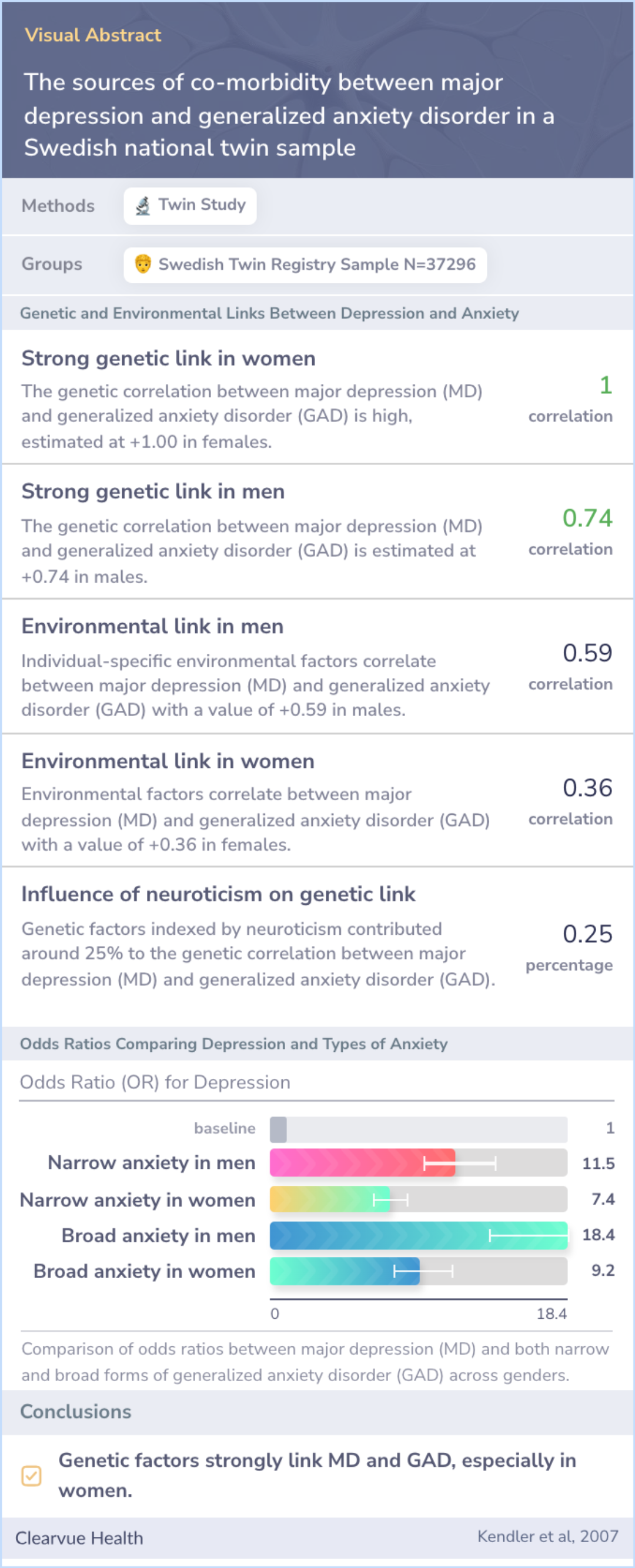
Study Summary
🔬
What They Studied
They studied the genetic relationship between major depressive disorder (MDD) and generalized anxiety disorder (GAD), examining the role of neuroticism.
💡
What They Found
The study found a strong genetic link between major depressive disorder (MDD) and generalized anxiety disorder (GAD), with neuroticism contributing about 25% to this connection.
📚
What This Means
The findings confirm that the genetic connection between major depressive disorder (MDD) and generalized anxiety disorder (GAD) is strong, especially in women, which aligns with current understanding that both genetic and environmental factors play a role in these mental health disorders.
Study Summary
Study Overview
The study explores the genetic links between major depressive disorder (MDD) and generalized anxiety disorder (GAD), questioning how these disorders are classified. It suggests a shift from traditional categorizations to a new system that reflects their shared genetic bases. Both disorders may share common risk factors, but not all genetic contributions come from personality traits like neuroticism.
The findings aim to provide clarity on how these mental health conditions relate, which could reshape diagnosis and treatment approaches.
The findings aim to provide clarity on how these mental health conditions relate, which could reshape diagnosis and treatment approaches.
Abstract: background
Prior studies report high levels of co-morbidity between major depression (MD) and generalized anxiety disorder (GAD) and suggest that these disorders are closely related genetically. The personality trait of neuroticism (N) is substantially correlat...more

Genetic Relationship Inquiry
"What are the nosological implications of the increasingly compelling evidence for the close genetic relationship between MD and GAD?"
Shared Etiology Implications
"These findings suggest that MD and GAD may share a common etiology, which has implications for how these disorders are classified and treated."
Independent Risk Factors
"The preponderance of the genetic risk factors shared between MD and GAD were not shared with N."
Study Summary
Methods
Researchers analyzed diagnoses of major depressive disorder (MDD) and generalized anxiety disorder (GAD) using data from over 37,000 twins in Sweden, collected through interviews. This approach helps isolate genetic factors by comparing similarities between identical and fraternal twins.
In a subset of 23,280 twins who completed a questionnaire on neuroticism, a model was used to evaluate how this trait interacted with MDD and GAD, considering the overlap in their genetic influences.
In a subset of 23,280 twins who completed a questionnaire on neuroticism, a model was used to evaluate how this trait interacted with MDD and GAD, considering the overlap in their genetic influences.
Abstract: methods
Bivariate twin models were applied to lifetime diagnoses of modified DSM-IV diagnosis of MD and GAD obtained at personal interview in 1998-2003 with 37296 twins from the population-based Swedish Twin Registry. A trivariate Cholesky model with N, MD a...more

Study Summary
Results
The findings showed a perfect genetic correlation between major depressive disorder (MDD) and generalized anxiety disorder (GAD) in women and a strong one in men, suggesting a significant shared genetic basis. Environmental factors unique to individuals also played a role, sharing features between the disorders.
Neuroticism's genetic influence was similar across both sexes but only accounted for a quarter of the genetic link between MDD and GAD. This implies other genetic factors contribute to the relationship.
Neuroticism's genetic influence was similar across both sexes but only accounted for a quarter of the genetic link between MDD and GAD. This implies other genetic factors contribute to the relationship.
Abstract: results
In the best-fit bivariate model, the genetic correlation between MD and GAD was estimated at +1.00 in females and +0.74 in males. Individual-specific environmental factors were also shared between the two disorders with an estimated correlation of +0...more
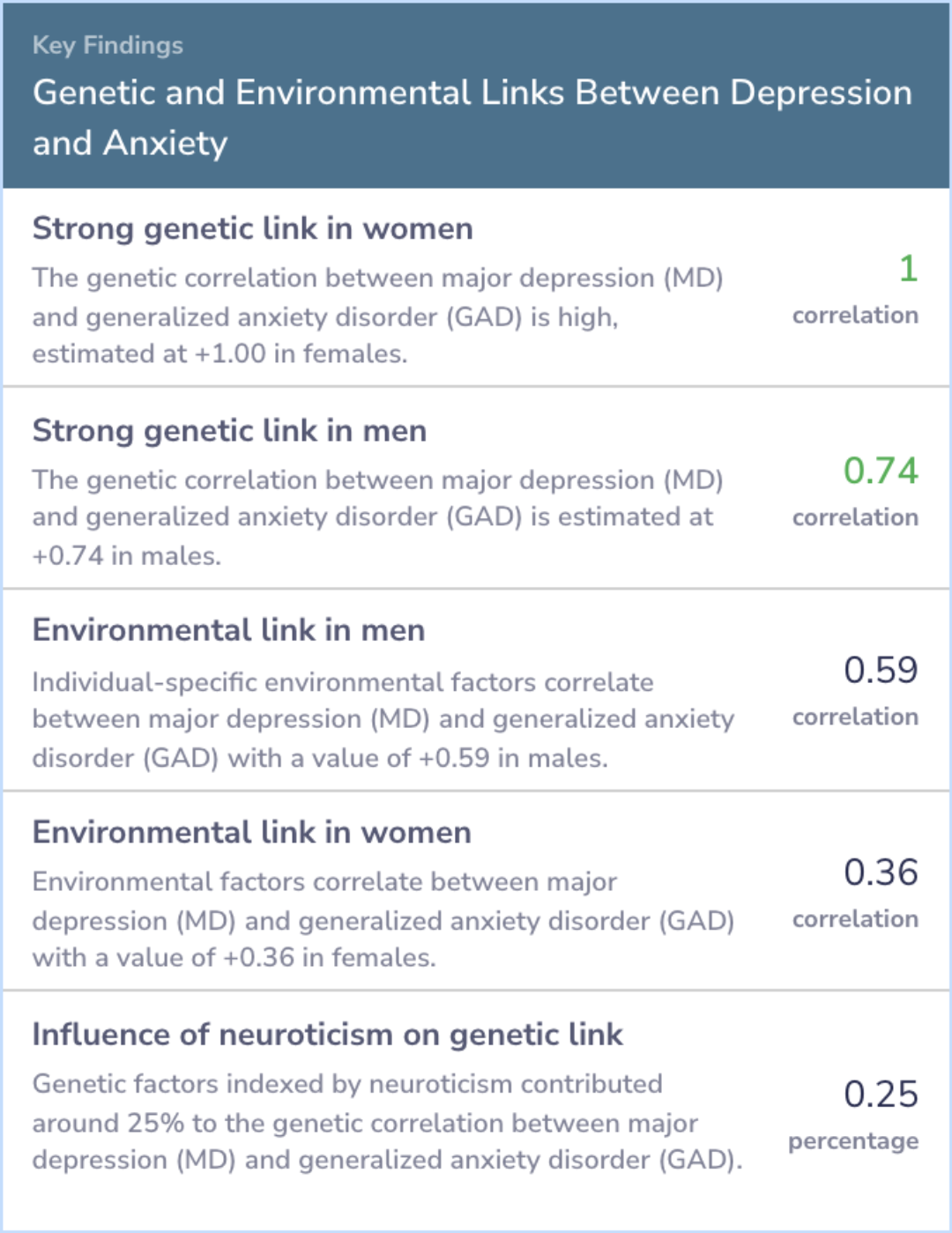
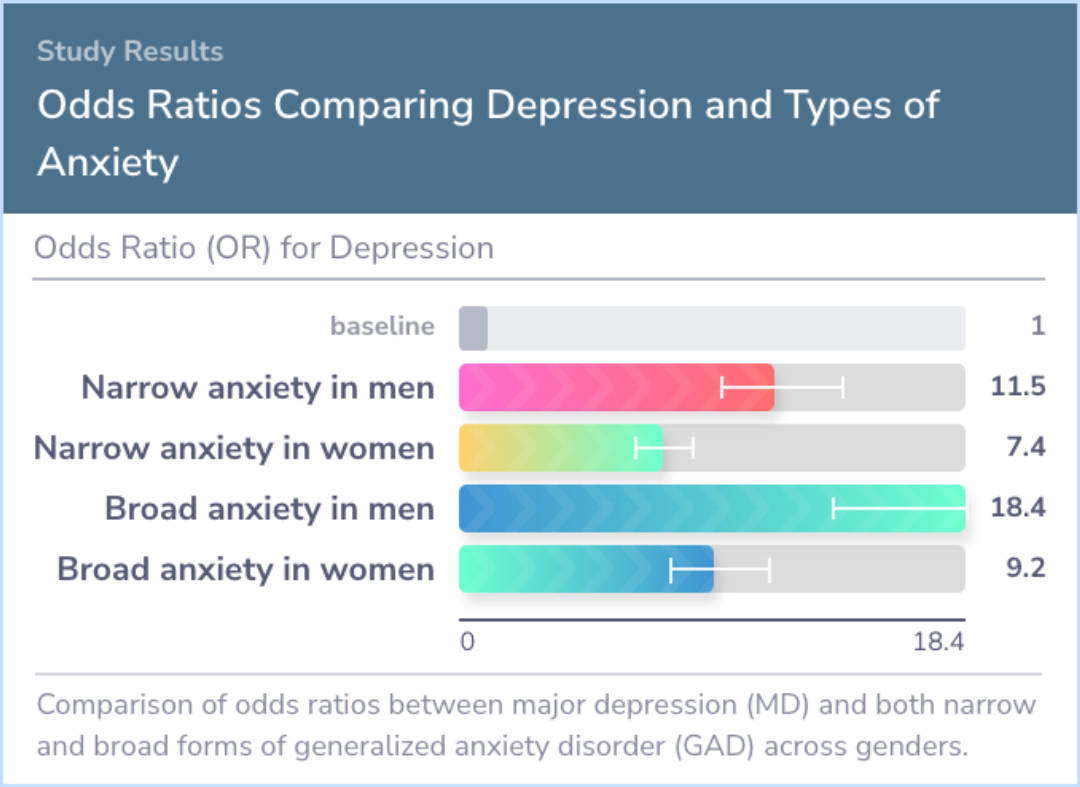
Study Summary
Conclusions
The genetic relationship between MD and GAD is pronounced, particularly in women. Although neuroticism significantly influences risk for these disorders, other genetic factors largely explain their connection.
These findings underscore the complexity of genetic contributions, indicating that while personality traits like neuroticism play a role, they do not entirely account for the disorders' genetic overlap.
These findings underscore the complexity of genetic contributions, indicating that while personality traits like neuroticism play a role, they do not entirely account for the disorders' genetic overlap.
Abstract: conclusions
Genetic risk factors for lifetime MD and GAD are strongly correlated, with higher correlations in women than in men. Although genetic risk factors indexed by the personality trait of N contribute substantially to risk for both MD and GAD, the majorit...more
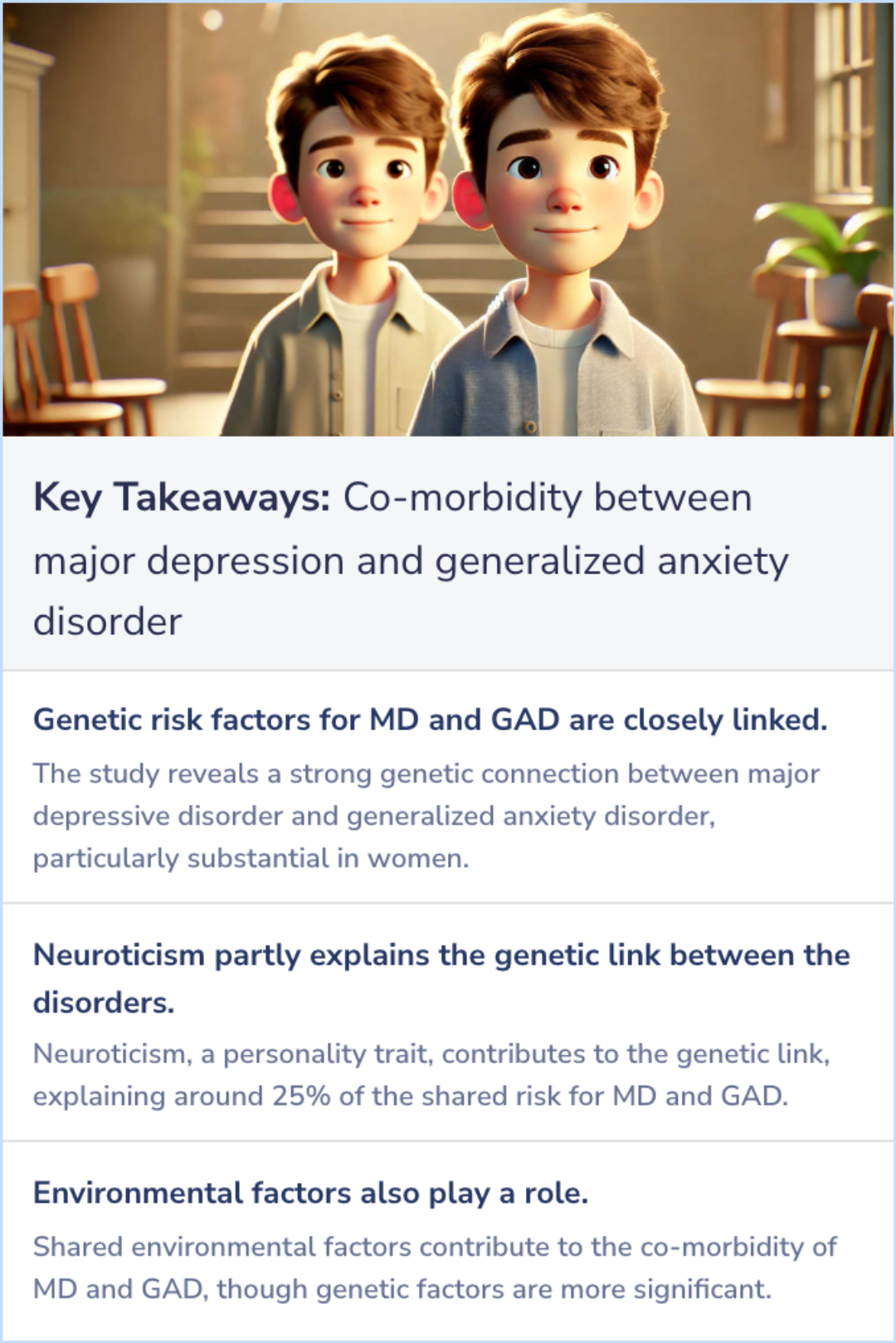
Background Information
Patient Guide
😟
Anxiety Disorder Characteristics
GAD involves excessive worry and physical symptoms like fatigue, complicating daily life.
😔
Depression Core Symptoms
MDD features persistent low mood, lack of interest, and cognitive impairments.
🧬
Genetic and Environmental Influences
Both GAD and MDD have genetic predispositions and are affected by life stress.
🧠
Neurotransmitter Imbalances
Serotonin and norepinephrine imbalances are shared in both GAD and MDD disorders.
🔗
Comorbidity Prevalence
High co-occurrence rates exist between depression and anxiety disorders.
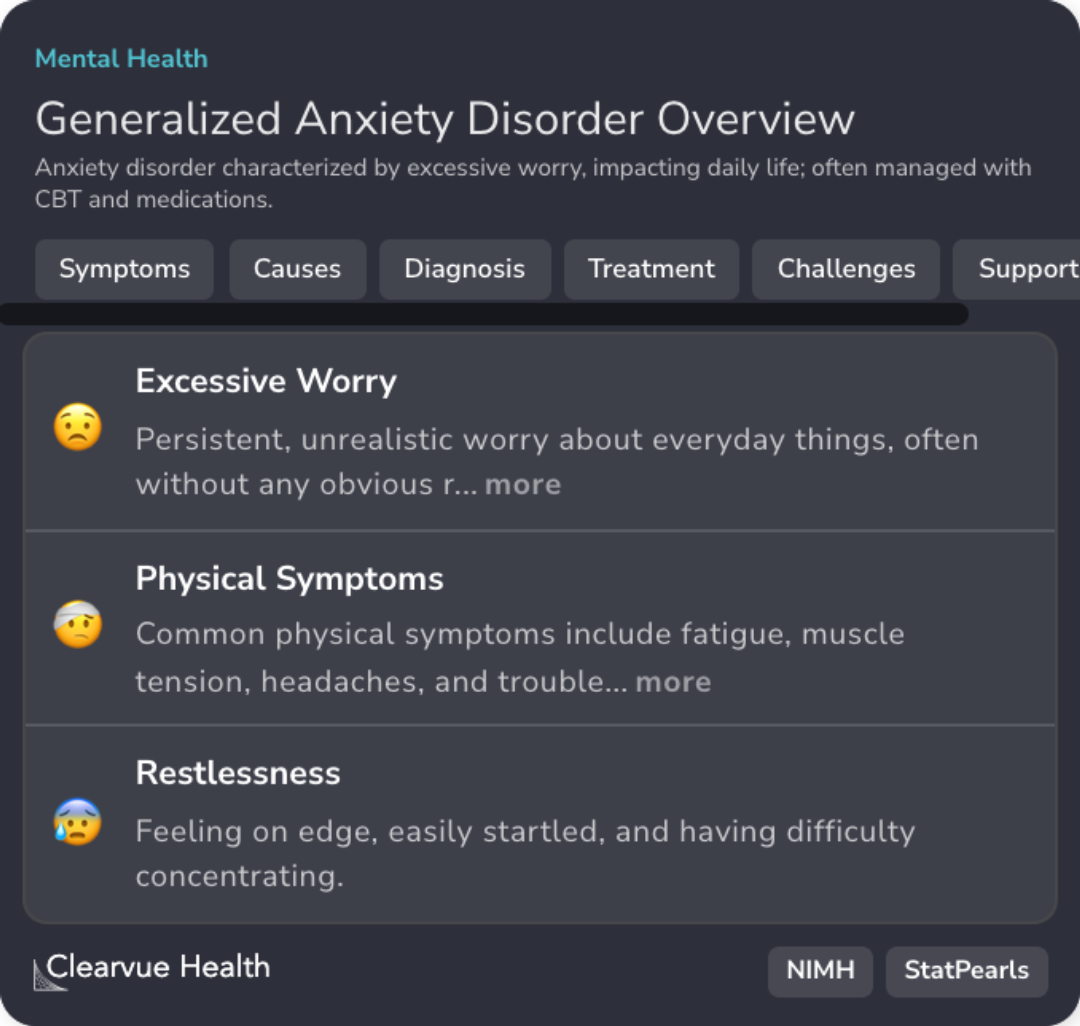
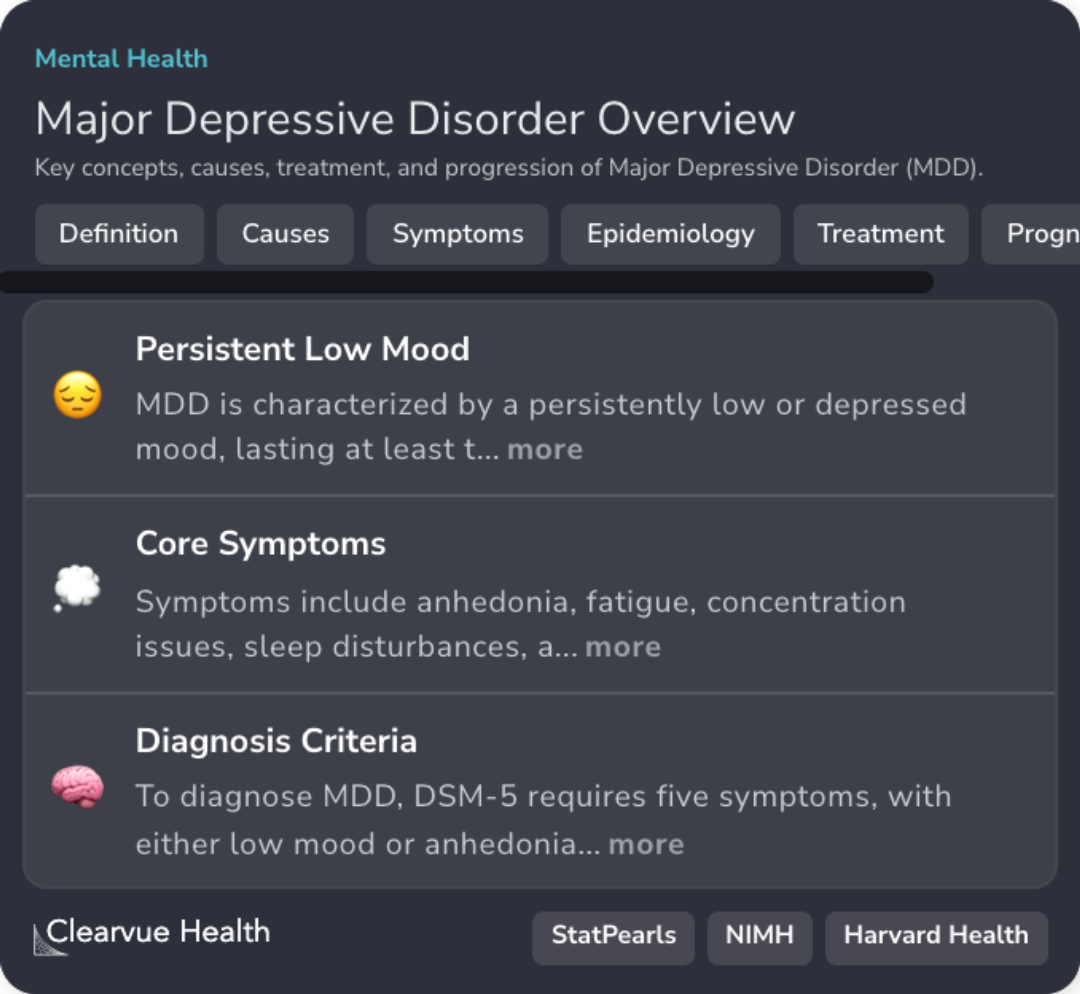
Professional Guide
Expert Opinion: Co-morbidity between major depression and generalized anxiety disorder
Findings underscore the intertwined nature of major depressive disorder (MDD) and generalized anxiety disorder (GAD), especially given shared genetic influences.
Comorbidity of these disorders intensifies symptom severity and functional impairment, complicating prognosis and treatment responsiveness.
Research identifies a shared heritability rooted in neuroticism, affecting both MDD and GAD.
This interaction culminates in a prolonged treatment timeline and diminished quality of life.
Comorbidity of these disorders intensifies symptom severity and functional impairment, complicating prognosis and treatment responsiveness.
Research identifies a shared heritability rooted in neuroticism, affecting both MDD and GAD.
This interaction culminates in a prolonged treatment timeline and diminished quality of life.
Evidence Summary
Uncertainty’s Role in Anxiety Disorders
Research reveals a strong link between feeling uncertain and experiencing higher levels of anxiety. Patterns in anxiety disorders show that people with low tolerance for uncertainty tend to have heightened anxiety levels.
Studies analyzed in this review suggest that uncertainty contributes to anxiety symptoms across various types of anxiety disorders, offering insights into shared features of these conditions.
Studies analyzed in this review suggest that uncertainty contributes to anxiety symptoms across various types of anxiety disorders, offering insights into shared features of these conditions.
Evidence Summary
When Anxiety and Depression Overlap in Patients
Generalized Anxiety Disorder (GAD) and Major Depressive Disorder (MDD) frequently coexist, particularly among patients seen in primary care. Both disorders share symptoms that can make diagnosis challenging, especially since these symptoms often overlap.
For healthcare providers, recognizing this common overlap between GAD and MDD symptoms enables more comprehensive patient care, allowing treatment to address both conditions together when necessary.
For healthcare providers, recognizing this common overlap between GAD and MDD symptoms enables more comprehensive patient care, allowing treatment to address both conditions together when necessary.
Evidence Summary
Impact of Multiple Conditions on Anxiety Recovery
When anxiety disorders co-occur with other psychiatric conditions, recovery paths can vary significantly. Patients with multiple mental health issues often face more challenges in managing anxiety symptoms.
Exploring the link between anxiety and conditions like depression or bipolar disorder, the piece delves into how these overlapping issues complicate both treatment outcomes and overall progress.
Comorbidities add layers to the anxiety recovery process, influencing treatment success and symptom management.
Exploring the link between anxiety and conditions like depression or bipolar disorder, the piece delves into how these overlapping issues complicate both treatment outcomes and overall progress.
Comorbidities add layers to the anxiety recovery process, influencing treatment success and symptom management.
